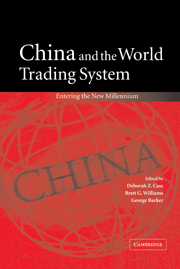Book contents
- Frontmatter
- Contents
- List of figures
- List of tables
- List of contributors
- Preface
- Acknowledgements
- Abbreviations and acronyms
- Introduction: China and the reshaping of the World Trade Organization
- PART I The world trading system
- PART II The accession
- PART III China – the domestic sphere
- PART IV Trade in goods
- PART V Trade in services and competition policy
- 13 WTO membership and professional services regulation in China
- 14 The impact of China's WTO accession upon regulation of the distribution and logistics industries in China
- 15 Regulating the new economy: implications of WTO accession for telecommunications and e-commerce in China
- 16 Segregation and convergence: the Chinese dilemma for financial services sectors
- 17 Adopting a competition law in China
- PART VI Intellectual property
- PART VII Dispute settlement
- Select bibliography
- Index
16 - Segregation and convergence: the Chinese dilemma for financial services sectors
Published online by Cambridge University Press: 28 July 2009
- Frontmatter
- Contents
- List of figures
- List of tables
- List of contributors
- Preface
- Acknowledgements
- Abbreviations and acronyms
- Introduction: China and the reshaping of the World Trade Organization
- PART I The world trading system
- PART II The accession
- PART III China – the domestic sphere
- PART IV Trade in goods
- PART V Trade in services and competition policy
- 13 WTO membership and professional services regulation in China
- 14 The impact of China's WTO accession upon regulation of the distribution and logistics industries in China
- 15 Regulating the new economy: implications of WTO accession for telecommunications and e-commerce in China
- 16 Segregation and convergence: the Chinese dilemma for financial services sectors
- 17 Adopting a competition law in China
- PART VI Intellectual property
- PART VII Dispute settlement
- Select bibliography
- Index
Summary
‘Financial segregation’ can refer either to ‘business segregation’ or ‘regulatory segregation’. ‘Business segregation’ means financial sectors operating along distinct business lines. Generally speaking, the distinct sectors are banking, securities and insurance. ‘Regulatory segregation’, on the other hand, refers to separate regulators regulating different financial sectors. For instance, the banking regulators usually regulate banks while securities regulators usually regulate securities markets. For the purpose of this chapter, the term ‘financial segregation’ is confined to the first meaning, namely ‘business segregation’.
In the past, financial segregation was common in western countries, the United States being the leading example. In the United States, the Glass–Steagall Act was adopted in 1933 to impose legal barriers between investment and commercial banking activities. Other countries, such as Japan, also adopted financial segregation as they modelled their financial regulations on the United States. In recent years, however, ‘financial convergence’ has become increasingly popular. Under financial convergence, institutions in one financial sector can engage in businesses in other sectors. At the end of 1999, the United States adopted the Gramm–Leach–Bliley Act. This largely removed the legal separation between businesses of investment and commercial banks, and created the necessary legal framework for financial convergence in the United States. In China, these alternative policies have generated attention and discussion in academic and government circles. The debates became more intense after China signed agreements with the European Union and the United States in 2000, paving the way for its accession to the WTO.
- Type
- Chapter
- Information
- China and the World Trading SystemEntering the New Millennium, pp. 283 - 298Publisher: Cambridge University PressPrint publication year: 2003



